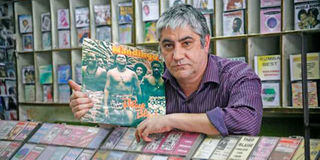When the music nearly stopped: Iconic Melodica on the rebound

Melodica Music Stores manager Abdul Karim in his shop during the interview in Nairobi on April 16 2014. FILE PHOTO | PHOEBE OKALL | NATION MEDIA GROUP
What you need to know:
- Initially named Bonanza, the store was founded by Karim’s father P. Daudia in 1962.
- Melodica is the only music shop in the city in modern times where one can still purchase a record player.
- To music lovers, musicians of a certain age and historians, Melodica music shop is more than a shop; it is akin to a museum.
For years, the music has been part of the general ambience; the street chatter out of the quick staircase. The music, mostly slow rhumba, oldies accompanying the clop of hurrying shoes and the din of downtown Nairobi, while through the window, past the decals, was a display of instruments, modern and traditional: palm-hide drums, guitars, drum sets, even a phonograph.
A classic life-size poster of Jimi Hendrix live at Fillmore East stadium in New York stands out in the background.
But for the past few months — until only recently when the Melodica music shop, located in Elimu House near the intersection of Tom Mboya and Ronald Ngala streets recouped most of its footing — its rhythm, the music has been missing. The shop itself is hidden from view behind a cordon of iron roofing sheet.
According to Abdul Karim, the owner, it all began when the management of the building began construction on the topmost floor.
Everything was fine until an iron roofing sheet wall was erected along the length of the building, blocking the entrance to the business premises. The turn of events would lead to a protracted court case, with Melodica and other business owners petitioning the erection of the wall, arguing that the wall should have been put up in the frontage of the floor under renovation as there was enough room. Losses were mounting as a result of the blockage.
The wall has since been pulled down under orders from the Nairobi County court, and the refurbishment suspended.
AN ACT OF MALICE
One night in early August, disaster struck when robbers attacked the music shop. When the pillage ended — after police arrived and the robbers fled — vintage record players were gone, others damaged. The destruction was indiscriminate — cassette tapes, records, some dating back to the 1960s — littered the floor, shattered. Guitars and other instruments no longer hang on the walls.
Thankfully, much of the collection of rare, vintage vinyl records and other musical memorabilia locked in the library in the back room remained untouched.
“Of course there was a lot of concern among our customers,” says Karim. “This whole debacle has led to a lot of loss of revenue. The break-in was devastating, but luckily we have a backup of our library.”
The attack, Karim believes, was both a case of robbery and malice.
To music lovers, musicians of a certain age and historians, Melodica music shop is more than a shop; it is akin to a museum. For decades, Melodica has been the last word, quite literally, in music; the one shop where music enthusiasts, some grizzled with age, could still find the music of their youth: on vinyl, scratchy and full of nostalgia.
The shop has also served as a reference point for music researchers and historians.
Melodica is the only music shop in the city in modern times where one can still purchase a record player — that ancient of music mediums pushed off the table with the arrival of the cassette tape player.
CAPTURING THE FUTURE
Initially named Bonanza, the store, which was founded by Karim’s father P. Daudia in 1962, operated on Luthuli Avenue, relocating to its current address in 1971. Daudia, a visionary businessman, saw the future and ventured to capture it: the post-independence landscape was fecund, but the conduit wasn’t there.
Other than Andrew Crawford Studios, only a few recording studios existed. Daudia especially sought out African musicians, many of whom could hardly meet the production costs. The patriarch soon established Melodica Records, a label that identified strongly with local, budding names.
Ochieng’ Kabaselleh, Joseph Kamaru and other legendary names at some point in their careers held sessions and had their music recorded at Melodica.
“We are back,” Karim says. “Support from our customers has been overwhelming.”
The unsavory experience has left Karim with a profound sense of brevity, of how things can turn. But the family store has been more than a business.
“I like to imagine we are like a museum, archives,” he says. There is no hubris in the statement. He is in the process of setting up a website where fans, including international ones, can access the music library.
The music is back, a sort of soundtrack to the comings and goings of life outside.




